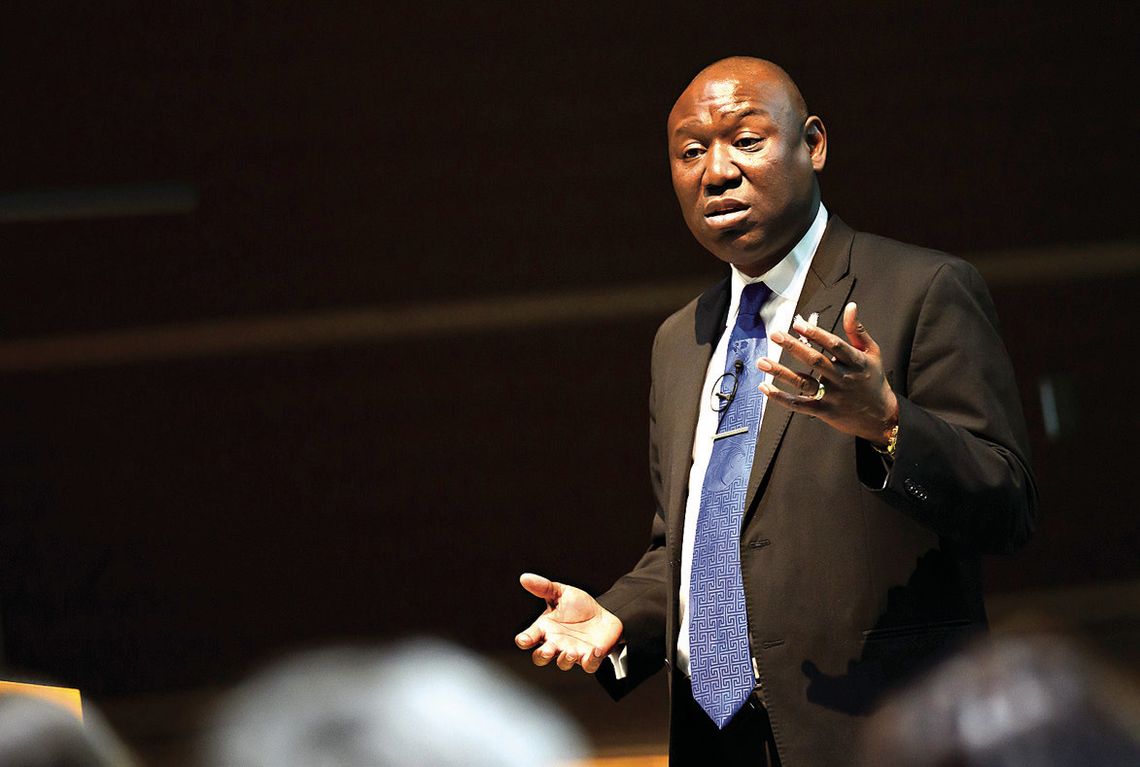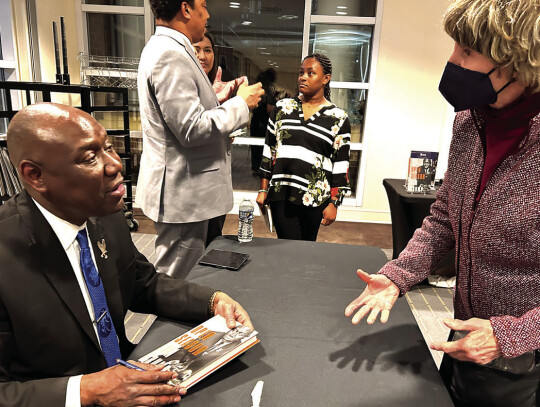By Jenny Hellwig To learn from Dr. Martin Luther King Jr.’s legacy, we should recognize we all have a role to play in the struggle for liberty, justice, and equality, prominent civil rights attorney Ben Crump told the crowd gathered in Wilson Concert Hall Sunday
at Washington and Lee University.
“You young people, who are going to be the next leaders of government and private sector and reign dominion over the courts — you all must not allow the enemies of equality to win,” Crump said, addressing the students in the room directly. “We must insist that the law must be used as an instrument for good, and not as a weapon for evil.”
The crowd of nearly 300 students, faculty and local residents rose to give Crump a standing ovation after he delivered the keynote address as part of Washington and Lee’s Dr. Martin Luther King Jr. celebrations. The university is celebrating King’s birthday with multiple days of events and programming relating to his life and legacy.
The service took place inside Washington and Lee’s Lenfest Center. Those without tickets could watch the speech on Zoom. Washington and Lee senior Tahri Phillips, the university’s 18th Rhodes Scholar, welcomed attendees as the master of ceremonies for the service, and law student Dominique Cravins introduced Crump.
The night began as the audience sang along to “Lift Every Voice And Sing,” which is known as the Black national anthem, and concluded with Tamara Futrell, dean for Diversity, Inclusion and Student Engagement at W&L, delivering closing remarks.
Crump has represented numerous families in significant civil rights cases, such as the families of Trayvon Martin and Michael Brown, along with representing residents of Flint, Mich., who were impacted by the water crisis there. Crump said during the speech that he is currently representing Henrietta Lacks’ family in a lawsuit against pharmaceutical company Thermo Fisher, on the grounds that they profited off of the harvesting of her cells.
Lacks, who was born in Roanoke, died in 1951 of cervical cancer but the unique properties of her cells discovered during her treatment made them one of the most important cell lines in medical research to this day. Scientists had removed some of the unusual tissues from her tumor shortly before she died without her consent, which was not required at the time.
“Pharmaceutical companies have made billions upon billions of dollars from Henrietta Lacks’ cells, even though she died a horrific death,” Crump said. “Her family has never received one red penny.”
He said that thanks to Washington and Lee School of Law professor Doug Rendleman’s amicus brief in support of the case, they finally have the chance to get justice for Lacks’ family.
Injustices levied against the Black community during the past and present were the main focus of Crump’s remarks. He highlighted various facets of racial injustice, including the war on drugs, police brutality, and medical racism, among others.
Crump also addressed the complexities of the public’s opinion of Dr. King. Nowadays, everyone in America loves Dr. King and we tend to romanticize him, he said.
“But back when he was advocating for Black people and Brown people and all God’s children to have equality and justice, he was the most hated man in America,” he said.
Crump said that a lesson that should be gained from King’s work is that individuals should not be neutral or look the other way in the face of injustice.
“He said that moralminded individuals have a moral responsibility to oppose injustice, to oppose evil when they see it,” Crump said. “He further said in the Letter from the Birmingham Jail, just because they tell us it’s legal, that doesn’t make it right.”
Crump also answered several audience questions. In response to an audience member who asked him why he decided to pursue law, he described his experience as a 9-year-old boy being bussed to an integrated school. He said his mother told him the reason he was able to attend the new school was because of the Brown v. Board decision and Justice Thurgood Marshall.
“I said right there, when I grow up I’m gonna be like Thurgood Marshall. I’m going to fight to make people in my community, people who look like me, have that opportunity and the American dream,” Crump said. “And from that day to this one, I wake up every morning with the same objective.”
A virtual viewer asked Crump if he believed forcing people to pay money for racist and unjust killings and similar acts was more effective than putting them in prison. Crump said that he did believe that people should be held fully accountable for their actions, but it is rare that government officials will go to jail for killing people of color.
“What we do know, is if it bankrupts or causes their budgets to be compromised, that somebody’s gonna go to that police chief, and say, ‘We can’t afford to kill no more Black people this year,’” he said. “We’ve got to make it financially unsustainable.”
Crump said that his line of work is challenging — but if it were easy, everyone would do it.
“When you try to argue the right thing, I can’t promise you the appellate courts won’t overturn you. But I will tell you, there’s a court of higher authority,” Crump said. “If you argue what is right, you will always win.”






